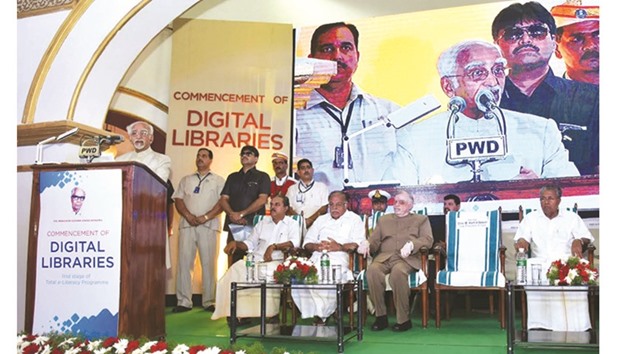Launching the second phase of Kerala’s ambitious total e-literacy campaign, Vice President Dr Hamid Ansari yesterday lauded the state for its efforts at empowering the citizens and improving human conditions.
Kerala, India’s first fully literate state, aims at becoming the first e-literate state as well within 33 months.
Last year, the state achieved a milestone issuing 10mn digital certificates to citizens, eliminating middlemen and bribery.
“With improved e-literacy skills, more individuals can access ICT based skill development and vocational training programmes,” he pointed out.
“Furthermore, these e-literacy skills are also very useful for effective participation in e-government, e-commerce, e-health and the use of personal electronic gadgets.”
The second stage of total e-literacy programme would involve establishing 100 digital libraries, which will provide resources and information to over five mn villagers in the state.
The first phase proceeded as per the schedule and 19 panchayats (village administrative units), covering some 325,000 people, achieved e-literacy by March this year.
“It is an outstanding attempt at empowering the citizens and providing them with e-literacy skills that will make it possible for them to participate productively in the global society and the information age,” he said, “and the quest for 100% e-literacy is reflective of the drive and spirit.”
“The poor and marginalised face tremendous challenges in overcoming the digital divide and using information technology as a tool for economic and social development. This, in turn, makes e-literacy a crucial skill to possess,” he said.
The vice-president, who arrived in the capital on a three-day visit on Monday, earlier, inaugurated the 90th birth anniversary celebrations of the late Karunakara Guru at the Santhigiri Ashram that the guru established in 1957 in Pothencode village 21km away from here.
“The change comes from introspection and by placing the welfare and benefit of others before self,” he said.
“This is now known the world over as a spiritual centre taking forward the teachings of the guru, who exhorted his followers to lead a life at peace with God and nature. The ashram promotes his transcendental spiritual values and ideals like universal love, world peace and religious harmony.”
He said the spirituality was a universal human experience — “something that touches us all.”
“Like your sense of purpose,” he said, “your personal definition of spirituality may change throughout your life, adapting to your own experiences and relationships.”
“The guru also challenged his followers to change their present way of thinking and move into a grander and larger experience- be meditation, prayer and service to others.”
He said there was growing acceptance that spiritual and contemplative practices are associated with better health and well-being, and it was an interesting, and fascinating, aspect of the human spiritual experience that all systems of faith or belief had within them the practice of meditation.
“The systematic practice of yoga has been found to reduce stress, decrease depression and anxiety, regulate blood pressure, and increase feelings of well-being,” he said.
“Beyond the essentially physical aspects of the science of yoga, lies its metaphysical dimension that focuses on the art of concentration and the method of control of the modification or fluctuation of the mind.
Similarly, prayer may also elicit a relaxation response, along with feelings of hope, gratitude, and compassion — all of which have a positive effect on the overall well-being of the individual, and by extension, the society.”
The Vice President unveiled the statue of renowned educationist Dr M Sreenivasan on the Sree Narayana College campus in Kollam on Monday and had two other engagements at the Raj Bhavan, the gubernatorial bungalow where he stayed.
Today, he will inaugurate the Vidyadhanam Scheme of the St Teresa’s College in Ernakulam before returning to New Delhi.
Prof PJ Kurien, deputy chair of the Rajya Sabha, the upper house of India’s parliament which the Vice President chairs, Chief Minister Pinarayi Vijayan and many other dignitaries were present at the airport to receive him on his second visit to the state this year.
After unveiling Dr Srinivasan’s statue, he said the late scholar personified Mahatma Gandhi’s saying that “the best way to find yourself is to lose yourself in the service of others.”
“He believed that the best way to deal with hopelessness was to serve others. He inspired his students to take up studies into the social, economic challenges facing the country, particularly the plight of the poorest and the weakest sections of our society, and in doing so, bring to light the injustice and pave the way for reforms and empowerment that would benefit the weaker sections,” he said.
“Generations of students who have passed from this college, under Dr Srinivasan’s tutelage, remember him with great affection and continue to spread his message of social reform through education throughout India and beyond.”

Vice President Hamid Ansari launching the second phase of Kerala’s ambitious e-literacy campaign in Thiruvananthapuram.
